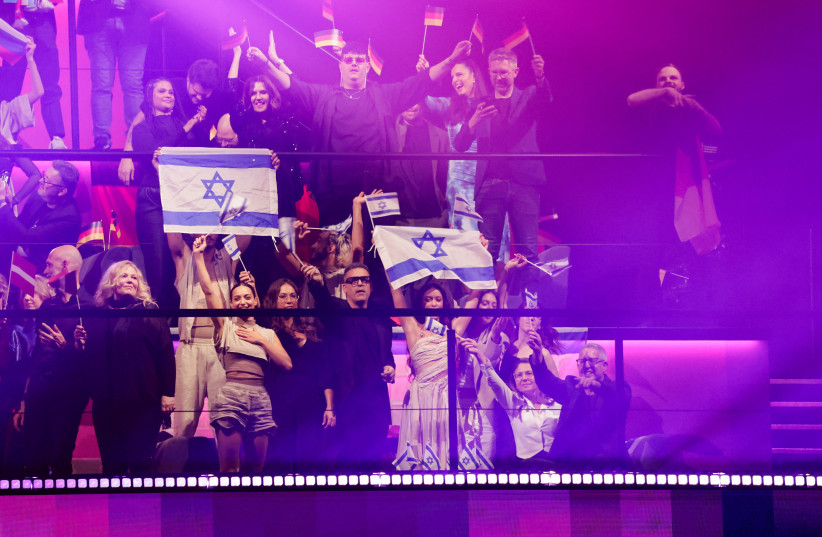Eden Golan flew back to Israel on Sunday morning, fresh off her triumphant performance in the 68th Eurovision Song Contest on Saturday night in Malmo, Sweden where she warmed hearts worldwide with her grace under pressure.
Speaking just as she stepped off the plane, she said, “Wow, I don’t know where to start. . . .It is a huge privilege that I am here and that I had the opportunity to represent our country, especially in moments like this, and that I represented the country and was the voice for everyone who needs to be sent home now,” referring to the 132 hostages still being held in Gaza by Hamas following October 7. “And I got to represent everyone who has fallen . . . Thank you, I felt everyone’s love and support. Just thanks.”
Golan seems to be as talented at focusing on what is truly important as she is at singing and dancing. Just after the competition ended and she learned that Israel’s song, “Hurricane”, had finished in fifth place and that the song was second in the televotes from the audience, she said in an interview backstage, “Hamsa, hamsa, hamsa!” a Hebrew word that means five. “I don’t have words, I’m so happy.” She thanked her team and supporters, and added, “We got to a crazy place, that’s our victory. It’s a great privilege to be here and to represent the nation.” Asked whether she felt pressured when hearing the low scores given to Israel by the national juries and waiting for the final result, she said, “I think it was understood [that it would turn out that way.]”

In the end, Nemo of Switzerland won the contest with the song, “The Code”, that deals with the singer’s coming to terms with their non-binary identity. Croatia’s Baby Lasagna, the heavy favorite early on, took second place with his high-energy song about a young man leaving home, “Rim Tim Tagi Dim”. Ukraine and France came in third and fourth.
The Grand Final winner is chosen by a combination of national juries from the participating countries and the audience’s televotes. Golan was right that it was no surprise that a group of European cultural professionals did not rank Israel’s song highly in this year’s contest, and that these juries mostly favored “The Code”. But it was gratifying for many Israelis and Jews around the world to see Israel coming in second in the televoting, just after Croatia. While a vocal minority of protesters oppose Israel’s fight against Hamas, obviously millions of Eurovision viewers around the world respect Israel and its Eurovision representative.
The world came out in support of Golan
Golan said in interviews last week that this year’s song contest “wasn’t just another Eurovision.” And it certainly wasn’t. Never before had thousands of artists called for the European Broadcasting Union, the body that runs Eurovision, to ban Israel from competing. Following the EBU’s refusal to ban Israel, these artists called for a complete boycott of the contest due to Israel’s presence.
Serious threats were made against the Israeli delegation and fans attending the contest. If it were just another Eurovision, the Shin Bet head, Ronen Bar, would not have gone to Malmo to personally see the security arrangements for the Israeli delegation, nor would the Israeli government have issued travel warnings for Israelis attending the event. According to multiple reports, 100 Swedish police officers were deployed to protect the Israeli delegation, who traveled in a motorcade with blacked-out windows like heads of state. Golan and her entourage were advised to stay in their hotel rooms at all times when not performing.
There were large protests outside the arena, including one in which climate activist Greta Thunberg was arrested on Saturday night. While Golan reported feeling “good vibes” at the competition, many artists went out of their way to disrespect her, including Ireland’s Bambie Thug, who said they cried when they learned Israel had made it to the finals. Greek singer Marina Satti pretended to fall asleep as Golan spoke at a press conference, and the Netherlands’ Joost Klein put a Dutch flag over his face.
Perhaps the worst moment was when a Polish journalist asked Golan, “Have you ever thought that by being here, you bring risk and danger for other participants?” as if he were blaming her for the fact that people were threatening her life. Told she didn’t have to answer the question, Golan responded, nonetheless, “I think we’re all here for one reason, and one reason only. And the EBU is taking all safety precautions to make this a safe and united place for everyone, so I think it’s safe for everyone.”
And in an ordinary year, the audience wouldn’t have erupted in boos whenever Israel performed, as it did this year, or boo whenever points were added to Israel’s total during the final tally.
Although many more experienced artists would have fallen apart under the pressure Golan faced, the hatred seemed to give her strength, as she concentrated on what she came to do: Sing “Hurricane”, a song with lyrics and a dance that reference the October 7 massacre, especially the killings at the Supernova Music Festival.
The word “character” is so overused that it may have lost its impact, but Golan truly showed that she had character and class, in a situation in which she was surrounded by people trying to harass and upset her.
When Israelis look back on this period, Golan’s moving rendition of “Hurricane” in Malmo will be a ray of light in a dark time, and a reminder that we can do our best even in the face of daunting obstacles.
